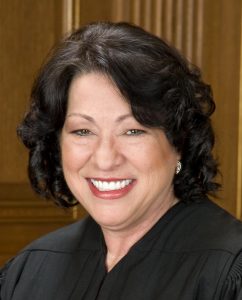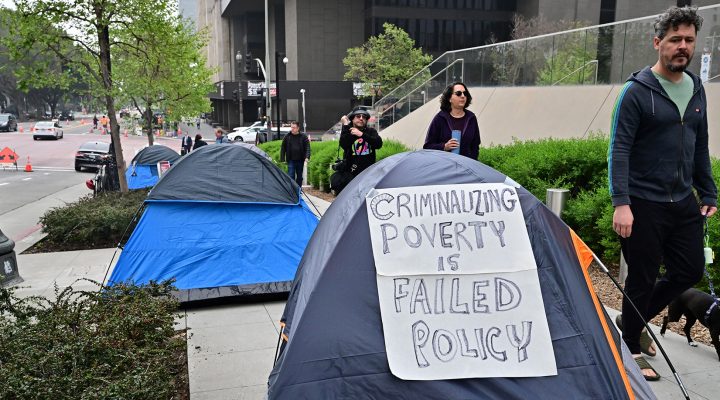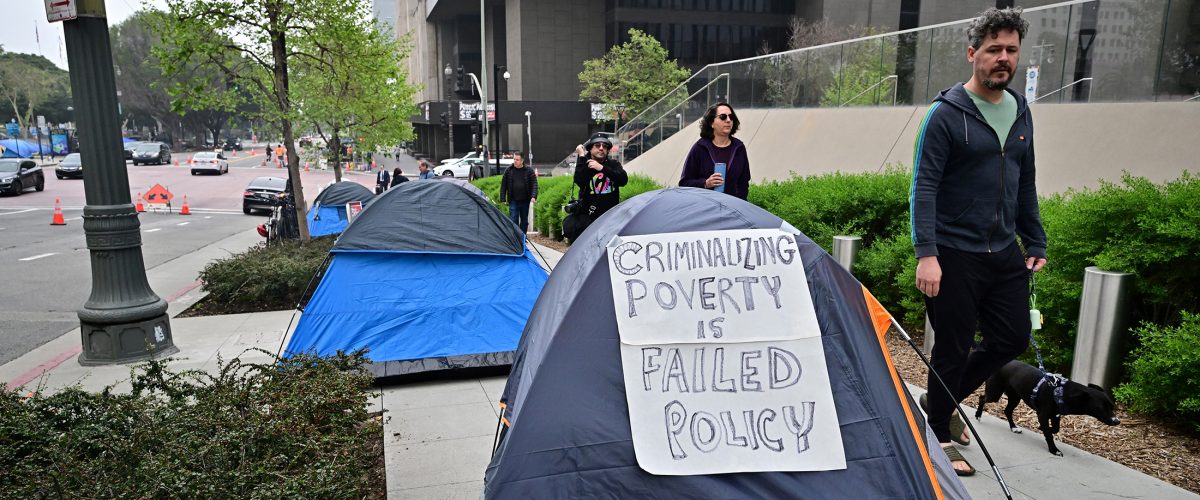A recent U.S. Supreme Court ruling frees municipalities to fine or arrest homeless people who camp on sidewalks or in parks and other public spaces.
Justices ruled 6-3 along ideological lines that an ordinance in Grants Pass, Ore., prohibiting public camping does not violate the U.S. Constitution’s prohibition against cruel and unusual punishment.
Dissenting Justices Ketanji Brown, Elena Kagan and Sonia Sotomayor argued the measure violates federal legal precedent against the criminalization of personal status, in this case being homeless.

Justice Sonia Sotomayor
‚ÄúSleep is a biological necessity, not a crime,‚ÄĚ Sotomayor wrote for the minority. ‚ÄúFor some people, sleeping outside is their only option. The City of Grants Pass jails and fines those people for sleeping anywhere in public at any time, including in their cars, if they use as little as a blanket to keep warm or a rolled-up shirt as a pillow.‚ÄĚ
For those without access to shelter, the ordinance is a punishment for being homeless, she continued. ‚ÄúThat is unconscionable and unconstitutional. Punishing people for their status is ‚Äėcruel and unusual‚Äô under the Eighth Amendment.‚ÄĚ
But in an opinion penned by Justice Neil M. Gorsuch, the high court majority disputed the claim that homeless people are targeted by the Grants Pass statute: ‚ÄúUnder the city‚Äôs laws, it makes no difference whether the charged defendant is homeless, a backpacker on vacation passing through town, or a student who abandons his dorm room to camp out in protest on the lawn of a municipal building.‚ÄĚ
Including homeless people as potential violators of the provision does not single them out any more than state laws against public intoxication target alcoholics ‚ÄĒ a point decided in Powell v. Texas in 1968, Gorsuch noted.

Gavin Newsom (Photo by Wang Zhao/AFP via Getty Images)
California Gov. Gavin Newsom, a Democrat whose state has one of the most high-profile and contentious homeless situations in the nation, hailed the June 28 decision in City of Grants Pass v. Johnson for enabling authorities to take action deemed necessary to safeguard public safety and to protect homeless people from the crime and unsanitary conditions encampments often produce.
‚ÄúToday‚Äôs ruling by the U.S. Supreme Court provides state and local officials the definitive authority to implement and enforce policies to clear unsafe encampments from our streets,‚ÄĚ Newsom said. ‚ÄúThis decision removes the legal ambiguities that have tied the hands of local officials for years and limited their ability to deliver on common-sense measures to protect the safety and well-being of our communities.‚ÄĚ
Echoing the high court majority opinion, Newsom said it should be left to states and cities to decide how to handle the complicated issue of homelessness within their jurisdictions. Cities like San Francisco and Los Angeles have become notorious for tent cities and other homeless communities in public spaces.
‚ÄúCalifornia remains committed to respecting the dignity and fundamental human needs of all people and the state will continue to work with compassion to provide individuals experiencing homelessness with the resources they need to better their lives,‚ÄĚ the governor said.

Tina Kotek
Oregon Gov. Tina Kotek, also a Democrat, said she is reviewing the court’s ruling in light of a 2021 state law requiring cities to factor in the availability of shelters, affordable housing and other resources when regulating public camping, KGW8 TV in Portland reported.
‚ÄúRegardless of the court‚Äôs decision, we must do all we can to address homelessness,‚ÄĚ she said. ‚ÄúThis includes addressing the primary driver of homelessness ‚ÄĒ our lack of affordable housing. My focus will continue to be on supporting Oregonians moving into housing and connecting them with the services they need to prevent homelessness.‚ÄĚ
The ruling in City of Grants Pass v. Johnson may provide support for a new Florida law that prohibits cities from allowing camping or sleeping on public property.
‚ÄúFlorida will not allow homeless encampments to intrude on its citizens or undermine their quality of life like we see in states like New York and California,‚Ä̬†Republican Gov. Ron DeSantis said in signing the legislation in March.
The law, which goes into effect Oct. 1, requires cities to allocate designated homeless camping spaces that will be monitored by the Florida Department of Children and Families and must include running water, restrooms, security and behavioral health services. Failure to comply opens municipalities to lawsuits from businesses and residents.

U.S. Sen. Marco Rubio (Photo by Octavio Jones/Getty Images)
‚ÄúThe legislation I signed today upholds our commitment to law and order while also ensuring homeless individuals have the resources they need to get back on their feet,‚ÄĚ DeSantis said.
Meanwhile, ordinances like the one passed in Grants Pass will do nothing to address the root causes of homelessness, according to the National Health Care for the Homeless Council.
‚ÄúThe ruling ‚Ķ¬†will do nothing to solve homelessness and do nothing to create the affordable housing needed in order to end homelessness,‚ÄĚ the council said. ‚ÄúInstead, this decision will only make life harder for unhoused people and subject them to even higher levels of arrests when they have nowhere else to go. Today‚Äôs ruling means localities don‚Äôt even have to try to link people with services or shelter before fining or arresting them.¬†The result is that more unsheltered people will die.‚ÄĚ
Catholic Charities USA President Kerry Alys Robinson criticized the Supreme Court decision and any policy that further marginalizes homeless people.
‚ÄúThe Catholic Church teaches that access to safe housing is a basic human right,‚ÄĚ she said. ‚ÄúOur country desperately needs to address a severe lack of affordable housing and related rising rates of homelessness. Criminalizing homelessness and imposing fines on people unable to pay them are neither practical nor humane solutions. We urge leaders at the federal, state and local levels, along with all people of good will, to join us in this effort to care for and uphold the human dignity of our brothers and sisters in need.‚ÄĚ
In her dissent, Sotomayor acknowledged the challenges local jurisdictions face in dealing with homelessness, but concluded people without access to shelters or affordable housing should not be punished for having nowhere else to go.
‚ÄúHomelessness is a reality for too many Americans,‚ÄĚ Sotomayor wrote. ‚ÄúOn any given night, over half a million people across the country lack a fixed, regular and adequate nighttime residence. Many do not have access to shelters and are left to sleep in cars, sidewalks, parks and other public places. They experience homelessness due to complex and interconnected issues, including crippling debt and stagnant wages; domestic and sexual abuse; physical and psychiatric disabilities; and rising housing costs coupled with declining affordable housing options.‚ÄĚ
Instead of recognizing those factors, the court‚Äôs majority sided with authorities at the expense of people with few or no alternatives to living on the street, she charged. ‚ÄúIt is possible to acknowledge and balance the issues facing local governments, the humanity and dignity of homeless people, and our constitutional principles. Instead, the majority focuses almost exclusively on the needs of local governments and leaves the most vulnerable in our society with an impossible choice: Either stay awake or be arrested.‚ÄĚ
Related articles:
Supreme Court hears case that could empower cities to fine people for being homeless
When my church and I let Jesus down: Jesus in the distressing disguise of the homeless | Opinion by Chris Ayers


